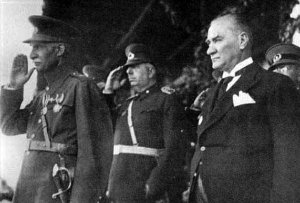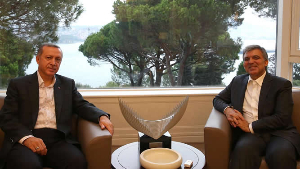Turkey Is Not Going to Be “Normalized” Under the AKP’s leadership
By Toni Alaranta (vol. 8, no. 14 of the Turkey Analyst)
There is widespread expectation that “normalization” and democratic consolidation will follow the June 7 election, which deprived the ruling Justice and Development Party (AKP) of its majority. The talk about “normalization” and President Recep Tayyip Erdoğan becoming “isolated” presupposes that Turkey’s democratic travails emanate exclusively from Erdoğan’s power hunger, and that once this factor is eliminated, the AKP will once again become the “normalizing force” it allegedly was previously. However, “normalization” would mean abandoning not only Erdoğan but the very political narrative disseminated by the AKP during its years in power, and thus the mission of the party.
The Case for a Coalition with the CHP: the AKP Needs to Refurbish Its Image in the West
By Halil Karaveli (vol. 8, no. 14 of the Turkey Analyst)
The AKP’s loss of its absolute majority in the June 7 parliamentary election may paradoxically offer the regime the chance to refurbish its tarnished image in the West. That, at least, is how some of the leading representatives of the regime judge the present situation. A coalition government with the center-left CHP is perceived as a chance for the AKP to rid itself of the charges of authoritarianism. Western endorsement has always been critically important for AKP, and the party is desperate to regain its lost legitimacy in the West. The question, though, is why the CHP would even contemplate lending itself to a project that would only entrench the AKP regime.

Can TÜSİAD Help Save Turkish Democracy?
By Halil Karaveli (vol. 8, no. 3 of the Turkey Analyst)
The historical record of TÜSİAD, The Association of Turkish Industrialists and Businessmen, as an agent for democratization is anything but encouraging. Today however, the interests of its members compel TÜSİAD to be a force for democracy and secularism. But mustering the force to defend these principles requires that the members of TÜSİAD break with a long tradition of bourgeois quietude and subservience to the state. But will they instead hunker down and seek salvation in adjusting to a capitalist model that does not depend on closer relations with the West?

Hitler’s Infatuation with Atatürk Revisited
By Halil Karaveli (vol. 8, no. 1 of the Turkey Analyst)
Atatürk was Hitler’s “shining star in the darkness.” The Third Reich instituted a veritable cult of Atatürk. The Nazi admiration provides a lens for a fresh look at Kemalism. In spite of its pretentions to stand for “enlightenment”, Kemalism has failed to midwife a democratic evolution. The question is whether this has anything to do with the aspects of Kemalism that the Nazis admired.

The Failed Promise of AKP: The Bourgeois Revolution That Never Was
By Halil Karaveli (vol. 7, no. 19 of the Turkey Analyst)
Liberals expected the Justice and Development Party (AKP) to be a democratic reformist bourgeois party, because unlike its predecessors of the right, it was deemed to represent an “authentic bourgeoisie.” However, the liberals not only read too much into the AKP as a bourgeois party. They also invested too much hope in the “authenticity” of the said bourgeoisie. The case of Turkey stands as an example that bourgeoisie and state authoritarianism can be mutually reinforcing.






